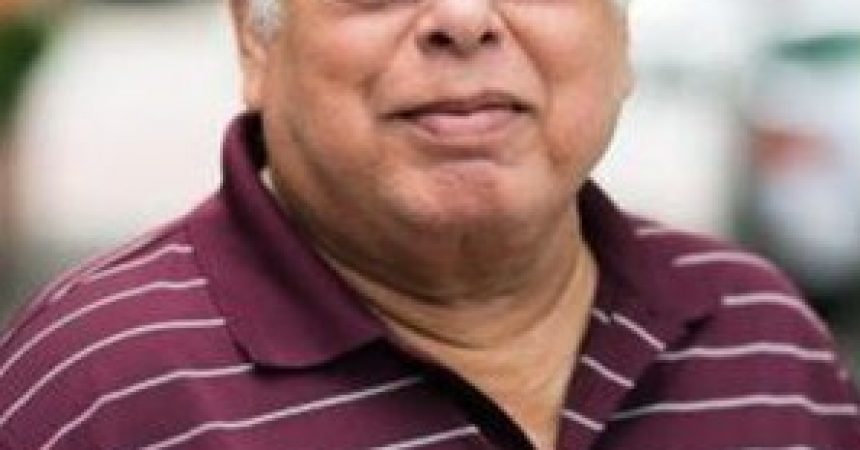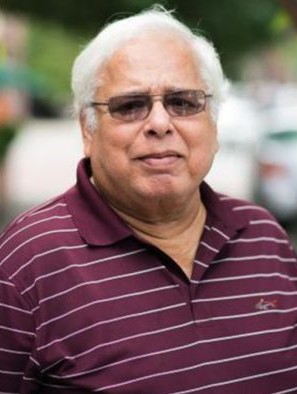
Daughter of COVID-19 victim works to honor father’s memory
By Barrington M. Salmon
Contributing Writer
@bsalmondc
Sabila Khan’s is one of more than 209,000 American families who have lost a loved one to COVID-19 since the global pandemic slammed the United States in March of this year. Earlier this month, she and others around the US publicly honored victims of coronavirus at an hour-long memorial event on the National Mall in Washington, DC.
Khan’s father Shafqat died unexpectedly in April after contracting the disease. He has been suffering from Parkinson’s for the past 10 years and was staying at a rehab facility.
She is left with the memories of her father, a larger-than-life figure who until his untimely passing, was the beating heart and the energy center of her family and his Jersey City, New Jersey community. Khan said her parents left Pakistan in 1973 and traveled to Libya where he worked as secretary at a pharmaceutical company.
“There wasn’t much opportunity in Tripoli, so he applied for a computer certification course at New York University and he and my mom sold everything they had to make the trip to the States,” Khan recalled. “The plan was that he would find a job that would sponsor him.”
“That job never materialized. We had no money to go back to Pakistan or Libya, so we were undocumented for over a decade,” said Khan. “My father worked six days a week, 12 hours a day working at a friend’s store. We didn’t have health insurance, we lived on the edge for many years, but my parents shielded us from these realities. We had a safe, loving childhood.”

Photo special to the Outlook
She remembers a man who never allowed any challenge to defeat him, who worked hard, made numerous sacrifices to provide for his family, and whose passion for politics, involvement in community activism and love of people made him a revered patriarch in Jersey City’s Pakistani community.
Shafqat Khan – married for 50 years, a father of three and grandfather of seven – died on April 14 when his health took a turn for the worst.
“COVID sounded very serious. I was very worried because it was in the height of COVID-19 in the New York-New Jersey area,” said Sabila Khan. “On Monday, April 6, it was 10 days that we hadn’t heard his voice. The nurse said he was very congested. And I said we had no idea he was even sick.”
Khan said the family was notified that facility staff had sent him to the emergency room of a hospital, located blocks from the family’s home.
“I was beside myself after I heard the news. He spent three days in what I imagine was a warzone of an ER before they found a bed for him,” said Khan who has worked at Penguin Books for 20 years. “My father was a big, tough guy but he hated hospitals. I can’t imagine the fear … the hospital is three blocks from us, and we couldn’t see him. It was special type of torture. He was doing pretty well. He never made it onto ventilators. We have doctors in the family, including one in infectious disease, who said it was looking pretty good, but on April 14th, they said he went into cardiac arrest. We urged them to keep trying and they tried for 15 minutes but he died.
“My father was diagnosed with Parkinson’s 10 years ago and I was under no illusions that he would live forever but never, in my wildest dreams did I think he’d die like this, without his family by his side. I wish we could have talked to him. We couldn’t see him at all. That was the hardest part. I understand they were trying to prevent the spread, but it was torture. We didn’t see him.”
Khan said she’s struck by the reality that after 9/11, the country came together against a common enemy, but as this pandemic has enmeshed the country “there is so much vitriol, anger, suspicion.”
So, she is quite thankful and pleased that the National COVID-19 Remembrance took place. The event was to ensure that those taken by coronavirus and their families aren’t forgotten. It was a collaborative effort led by COVID Survivors for Change. Organizers pulled together the memorial because six months into the pandemic, they say, America has not yet had a collective moment to grieve and remember the 200,000-plus parents, spouses, and children who have been lost.
The hour-long program which was streamed virtually from the Ellipse, South of the White House, was the first time the nation mourned together and honor the frontline workers who are risking so much, and receiving so little. Participants in the first National COVID-19 Remembrance will honor that sacrifice by calling for a national plan for recovery.
“This is a reminder to officials, those who run the country, in highest office, that we have experienced unbelievable loss and we need to be part of the conversation,” Khan said. “We will not be ignored. I’m so thankful that this is happening. It’s really, really important. There’s this idea that 9/11 was traumatic, and the fact that the pandemic has killed exponentially more people is the reason why this must be done.
“Our bereaved community is going through trauma. It is very important that our loved ones not be forgotten or relegated to statistics. We need them memorialized now. We need our trauma to be acknowledged now. It is minimizing to us when people don’t take COVID seriously. This pandemic feels endless.”
Dionne Warwick, Grammy award-winning singer and former U.S. Ambassador for Health, was also a host of the event. She was joined by faith leaders, health care professionals, frontline workers, and Americans who have lost someone they love to COVID-19. There was live and recorded tributes featuring musical performances and speakers
Twenty-thousand empty chairs were placed on the National Mall to represent a fraction of the more than 200,000 lives lost due to COVID-19. With no end in sight, organizers are calling for action. There is added urgency, organizers say, because President Donald Trump, his wife Melania and other high-profile political figures have become the latest Americans to test positive for coronavirus.
Four days after her father’s passing, Khan said she searched for and realized that there was no online group that offered a place for families of COVID victims to gather, support each other and grieve. Her next step for the New York-area resident was to create a survivor’s support group on Facebook: the COVID-19 Loss Support for Family and Friends.
“I don’t know what I would do if I didn’t have this,” she said. “This group has given me a sense of purpose. I feel like there’s a thru-line from my father’s community service to what I’m doing for this community now. Everything is triggering for us – TV, social media, family, friends, everything. I’m so glad that I’m able to do this.
“In those early days, we spread word of the group in other local Facebook groups I was a part of,” she said. “Even today, most of the people in the group are from the NY-NJ area. It’s grown since the early days and become a safe space for people to mourn. Recently someone posted at 3 a.m., saying her mother had just died and she didn’t know what to do. There were 20 comments in response to her overnight. It was such a beautiful moment.
The group, she says, has a specific purpose for her.
Khan said she despairs as she sees the devastation COVID has wrought nationally. She said her bereavement group is apolitical, but she said she’s extremely angry because the more than 209,000 deaths and the more than 7.3 million Americans who were or are sick were avoidable.
“Yes, politics is the reason why he’s dead. While I’m very angry about how my father died, I’ve made a very conscious choice to not live in that anger,” she said of her father. “I just can’t live in that space and be healthy. Our loved ones didn’t have to die. I just want politicians and Americans to stop questioning science. It blows my mind that people still do in the 21st century. I wish people would trust science.
She said her father’s burial a day after his passing, was one of the most surreal experience of her family’s, who had to watch via livestream.
“Every religion and culture has rites and ceremonies marking death – in the absence of this, grief is prolonged, grief is complicated, and grief becomes trauma,” she said. “The whole COVID bereaved community is dealing with trauma.”
“It’s not important that my father’s face and name be in a memorial. Some of those in my group want and need this,” she explained. “But I don’t want COVID to be the defining event of my father’s life. He had a long, rich, vibrant life, especially contributing to his community. In starting this group I’m doing this for him. Keeping him alive.”







